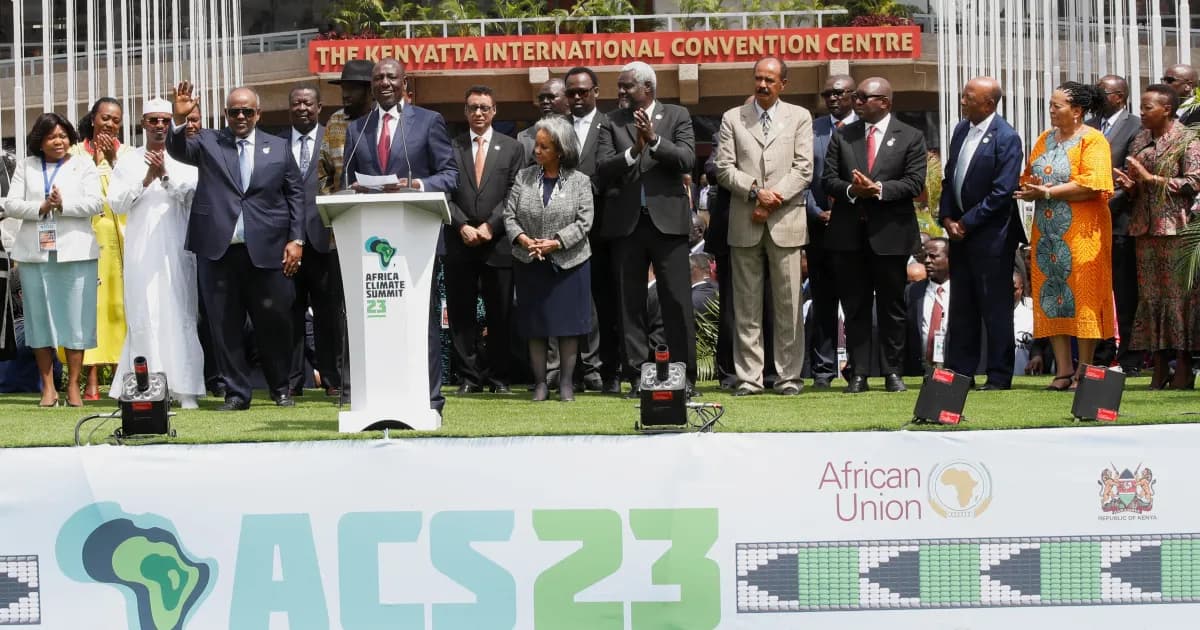We're loading the full news article for you. This includes the article content, images, author information, and related articles.
The Africa Climate Investment Summit’s deal rooms delivered a stark message to Kenyan entrepreneurs: impact is not enough. To unlock critical funding, innovators must master the language of finance and prove their ventures are bankable.

NAIROBI – The Africa Climate Investment Summit (ACIS), held from Tuesday, October 28, to Thursday, October 30, 2025, at Nairobi’s Edge Convention Centre, marked a pivotal shift in the continent's climate finance narrative. Convened by the Kenya Climate Innovation Center (KCIC), the summit aimed to move beyond policy discussions and catalyse tangible investments into Africa’s green economy ahead of the COP30 conference in Belém, Brazil. For the hundreds of Kenyan innovators in attendance, the summit’s high-stakes “deal rooms” provided a sobering education in the unforgiving realities of venture capital.
The central theme, articulated by speakers including Environment Cabinet Secretary Dr. Deborah Barasa, was a resolute move from aid dependency to self-powered investment. “Let this summit be defined not by speeches, but by deals sealed; not by pledges, but by projects funded,” Barasa stated during the opening ceremony on Tuesday, October 28. This sentiment underscored the summit's core function: connecting capital with innovation. Yet, for many entrepreneurs, this connection proved to be a formidable challenge, revealing a critical gap between developing climate solutions and securing the financing to scale them.
The deal rooms were the summit's crucible. Here, entrepreneurs pitched their ventures in renewable energy, sustainable agriculture, waste management, and nature-based solutions to panels of local and international investors. The atmosphere was tense, a blend of ambition and anxiety, as innovators faced rapid-fire questions about financial metrics that often extended beyond their core expertise.
Esther Njeri, CEO of Utheri Energy Solutions, a company that provides clean energy alternatives like fire briquettes from agricultural waste, was among those who pitched. While optimistic after two investors approached her booth, she shared a crucial lesson with the Daily Nation on Tuesday, November 4. “We have learnt to quantify our impact and present it in terms that investors understand, like payback periods and customer acquisition costs,” she said. This highlights a primary takeaway from the summit: the ability to translate environmental and social impact into a compelling, data-driven financial case is non-negotiable.
Investors in the deal rooms were frank in their feedback. Many noted that while the passion and innovation were evident, a significant number of ventures lacked the financial sophistication required for investment. Common pitfalls included weak revenue models, unclear paths to profitability, and an inability to articulate a scalable business strategy. According to a report by Africa Sustainability Matters on October 30, the consensus among funders was that many early-stage ventures require blended capital—a mix of grants and commercial investment—and intensive technical advisory support to transition from prototypes to revenue-generating enterprises.
Panel discussions featuring leading figures in African finance reinforced the lessons from the deal rooms. A key session on Tuesday, October 28, titled “Unlocking African Investments into the Green Economy,” brought together experts like Catherine Masolia, Managing Director of Somo Africa, and Francis Nasyomba, CEO of Raisin Capital.
Masolia, whose organization Somo Africa supports entrepreneurs in marginalized communities, emphasized the need for tailored financing models. She argued that standard commercial debt is often unsuitable for early-stage climate ventures that are creating new markets. “We need to start with grants, then move to concessional loans, and eventually transition to commercial debt,” Masolia advised, stressing that this phased approach is crucial for nurturing businesses that traditional finance might overlook.
Nasyomba, a seasoned investment professional, spoke to the necessity of entrepreneurs understanding the investor's perspective. Raisin Capital focuses on structuring deals and raising capital for East African businesses, and Nasyomba’s insights underscored the demand for rigorous financial discipline. The key message for innovators was that a compelling climate solution is only the first step; it must be packaged within a robust business model that demonstrates a clear return on investment. This sentiment is particularly relevant in Kenya, where despite a surge in climate tech funding—capturing 46% of the country's total startup funding in 2024—an early-stage funding gap persists, with only 5% of seed-funded startups progressing to Series A.
The summit's outcomes hold significant implications for Kenya, a nation positioning itself as a hub for green innovation. The launch of the Africa Climate Investment Platform and a new Revolving Fund during the summit are designed to create the infrastructure needed to bridge the existing finance gap. These initiatives aim to standardize due diligence, assemble investment-ready projects, and provide the catalytic, early-stage capital that innovators desperately need.
However, the lessons from ACIS 2025 are clear: the success of these platforms will depend on the capacity of Kenyan entrepreneurs to meet investor expectations. The summit served as a critical diagnostic, revealing that technical and financial literacy are as vital as the innovations themselves. For Kenya to fully capitalize on the estimated USD 62 billion required to meet its climate commitments, of which USD 45 billion is targeted from the private sector, it must invest in building the financial acumen of its innovators.
As delegates departed, the prevailing sentiment was one of cautious optimism. The summit successfully shifted the conversation from abstract commitments to the mechanics of deal-making. For Kenya's vibrant community of climate entrepreneurs, the path forward is now clearer, albeit more demanding. The hard truths of the deal room have provided an invaluable lesson: to build a sustainable future for Kenya and the region, passion must be paired with a proficiency in the universal language of investment.
Keep the conversation in one place—threads here stay linked to the story and in the forums.
Other hot threads
E-sports and Gaming Community in Kenya
Active 8 months ago
The Role of Technology in Modern Agriculture (AgriTech)
Active 8 months ago
Popular Recreational Activities Across Counties
Active 8 months ago
Investing in Youth Sports Development Programs
Active 8 months ago
Key figures and persons of interest featured in this article